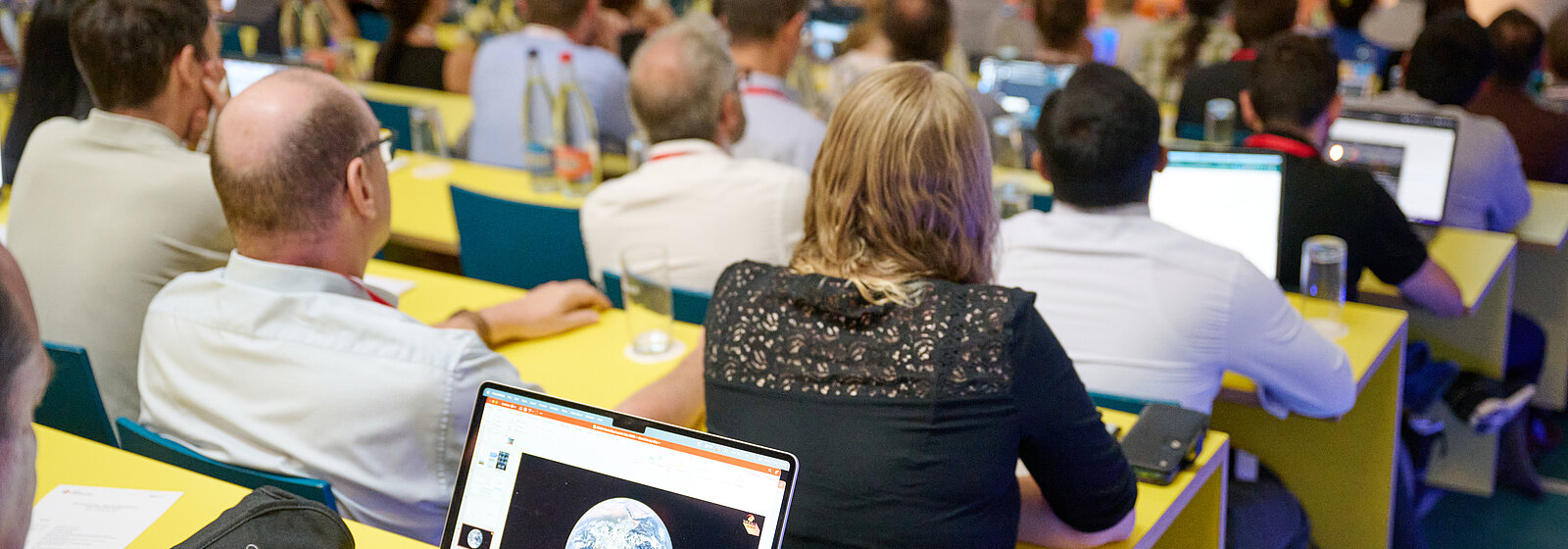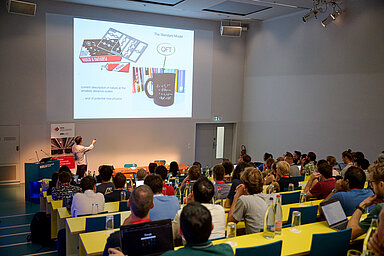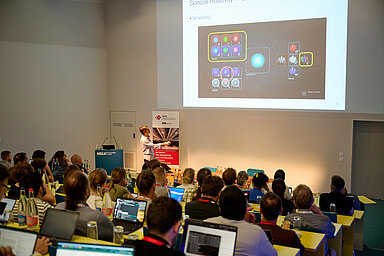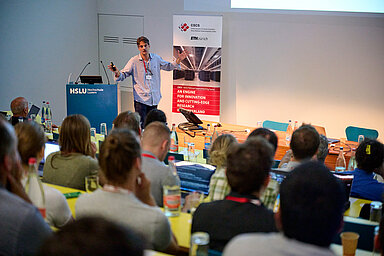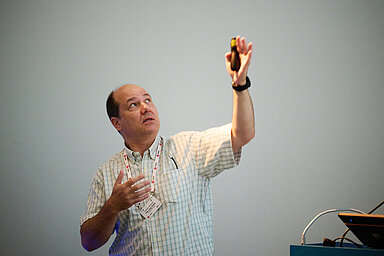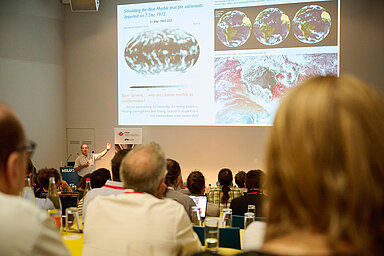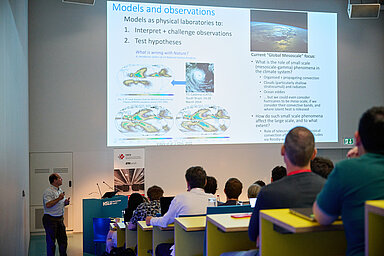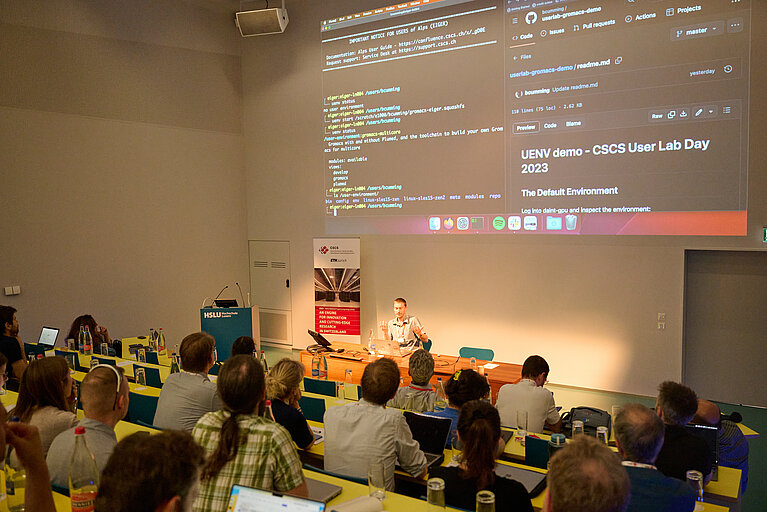October 13, 2023 - by CSCS
After a short welcome and an outline of the agenda, the day started with two keynote speakers from the CSCS Scientific Advisory Committee (SAC). Luigi Del Debbio, Professor of Particle Physics Theory at the University of Edinburgh, outlined challenges for and requirements of Quantum Field Theories in the exascale era. Del Debbio, who also acts as the chair for the EuroHPC Resource Access Committee, enthusiastically participated in a discussion with participants and provided welcome feedback on the EuroHPC regular and extreme scale calls. The second speaker was Pier Luigi Vidale, Professor of Climate System Science at the University of Reading Meteorology Department and Senior Scientist at the Climate Directorate of the National Centre for Atmospheric Science (NCAS-Climate). Vidale’s presentation provided an overview of scientific efforts to address climate change.
Everything changes but nothing changes!
Following the scientific keynote lectures, the User Lab Day focused on the upcoming Alps infrastructure, which is expected to be put in service on April 1, 2024. Luca Marsella, Senior Software Engineer and Service Manager at CSCS, gave the first of a series of presentations and updated the community on the CSCS Service Catalog and policies. He pointed out that the infrastructure will change profoundly in order to achieve HPC and cloud convergence, but he also expressed his hope and confidence that users will see little difference in their day-to-day work and have a similar user experience as they are used to with the traditional HPC system of Piz Daint.
Ben Cumming, Senior Research Software Engineer at CSCS, explained the User Environments approach on the new HPC platform in more detail. He pointed out in particular that programming environments will not be bound to the vendor provided environment like it has been the case for Piz Daint. The move away from the traditional monolithic approach constitutes an important change that will make use of CSCS infrastructure more flexible and easier overall. Cumming ended his presentation with a short hands-on demonstration on Eiger, a test environment set up for Alps.
It is time to apply for resources on Alps
Maria Grazia Giuffreda, Associate Director at CSCS, started the afternoon session with a comprehensive overview of upcoming proposal submissions. In 2024 allocations will be granted on the HPC platform of Alps, which has several important implications for resource requests. For this reason, CSCS is currently working on a new technical template, which will be available for the next submission deadline in May.
Giuffreda also announced that CSCS will open a Machine Learning (ML) Exploratory Call by the end of 2023. The Alps infrastructure is especially suitable for Artificial Intelligence (AI) type of work and CSCS wants to open it to Swiss researchers who wish to follow challenging ideas in the ML/AI area that go beyond what CSCS has dealt with so far.
Unveiling the Alps Infrastructure
Miguel Gila, Senior System Engineer at CSCS, shed some light on the technical details of Alps. He described the hardware components in detail and explained how Alps will allow us to achieve HPC and Cloud convergence. Gila explained the concept of versatile software-defined clusters (vCluster) and showed how Alps will allow us to create independent platforms and to accommodate customers and researchers with different requirements, such as MeteoSwiss PSI, MaterialsCloud, and more.
The last part of his presentation focused on storage specifications and strategy. Gila showed how CSCS is moving from the current IBM Spectrum Scale (GPFS) solution to a lustre solution, that is, from a stable persistent storage to a capacity storage persistent and very fast. He explained the impact this change will have on a typical user workflow.
Guilherme Peretti-Pezzi, Senior Computer Scientist at CSCS, outlined the CSCS training program and explained how it tries to help users to take full advantage of the CSCS infrastructure.
To close the event, Maria Grazia Giuffreda reported on the User Lab in numbers, showing resource usage in 2022, ranked per scientific field, institution, and storage needs. Giuffreda also reminded CSCS users of the importance to acknowledge CSCS resources in peer-reviewed publications, this being an important metric to demonstrate that resources are allocated to high-quality, productive research projects.
Next year in Lucerne!
Giuffreda finally alerted the community of deadlines for two major events of interest to the user community: PASC24 in Zurich on June 3-5, 2024, and the next User Lab Day on September 2, 2024, again in Lucerne. To close the event, CSCS staff, keynote speakers and participants enjoyed a rich apero while discussing concerns and open questions.
